
Vol. 77, No. 11, November
2004
Class Action
Dozens of law practitioners migrate to the U.W. Law School each
spring semester to spend several days helping to teach the lawering
skills course by sharing their knowledge and experience with future
lawyers. Why do they do it?
Sidebars:
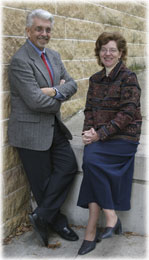 |
| Prof. Ralph Cagle and Prof. Gretchen Viney of the U.W. Law School
faculty are directors of the Lawyering Skills course. The goal of the
course, Cagle says, "is to teach law students what lawyers really
do." |
by Dianne Molvig
In countless ways, Wisconsin lawyers donate their time, expertise,
and experience to serve others. Some attorneys do so by heeding what
could be referred to as the annual Cagle Call.
Each year, Ralph Cagle, a clinical professor at the University of
Wisconsin Law School, Madison, recruits attorneys to assist in teaching
the Lawyering Skills Course, for which Cagle serves as director and
faculty member Gretchen Viney is associate director.
Some 80 lawyers and other professionals respond, arriving on campus
to teach for typically a four-day stint sometime during the second
semester. The course covers the range of skills all lawyers use, in
whatever areas they practice, including client interviewing,
communicating, counseling, negotiating, drafting, advocating, problem
solving, and more. "The goal," Cagle explains, "is to teach law students
what lawyers really do" through a learning-by-doing approach.
The attorneys who help teach the course represent a wide diversity of
practice areas. They come from large offices and solo practices, from
urban areas and small towns. For some, the trip to the law school is a
short stroll down State Street from their downtown Madison offices,
while for others it's a several-hour drive from distant corners of the
state.
They put in a full schedule each day, usually teaching in the
afternoons and preparing, planning with coinstructors, and grading
students' work in the mornings. For that, they receive $50 per day,
although some donate the money back to the law school. Even for those
who pocket the small stipend, their efforts essentially amount to
volunteer duty.
 No program like this exists at any other law school in the
country, as far as Cagle has been able to determine. While some law
schools offer general practice skills courses, he notes, they are taught
mostly by regular faculty who may bring in practicing attorneys to teach
a single class session. "I know of nothing anywhere else," Cagle says,
"that's on the scale of what we do here."
No program like this exists at any other law school in the
country, as far as Cagle has been able to determine. While some law
schools offer general practice skills courses, he notes, they are taught
mostly by regular faculty who may bring in practicing attorneys to teach
a single class session. "I know of nothing anywhere else," Cagle says,
"that's on the scale of what we do here."
In fact, he often receives inquiries from law school deans who'd like
to replicate the U.W. program. But once they find out how the course
operates, invariably they question how it's possible to recruit so many
practicing attorneys to give so much of their time for so little pay.
"There is a profound generosity at the heart of this," Cagle
emphasizes.
We asked a few of these generous souls to share some thoughts about
their involvement in the program. Why do they participate? What do they
think they impart to the law students, mostly 3Ls? And what do these
attorneys themselves take away from the experience?
A Matter of Service
U.S. Highway 51 hits its northern endpoint in Hurley, Wis., where on
Silver Street you'll find the law office of solo practitioner Paul
Sturgul. Since the local mines closed years ago, the community has
shifted to a primarily elderly population. Sturgul's practice focuses on
elder law and estate planning.
Come late winter, he'll head down Highway 51 toward Madison, nearly
300 miles away, to join three other attorneys in teaching a unit on
estate planning and other elder law issues. "I get back a lot," Sturgul
says of his teaching week. "It's the whole idea of service."
That concept applies not only to his teaching contribution but also
to his overall perspective on his profession. "I do what I do as a
lawyer," Sturgul explains, "because it makes my heart sing. The money is
a happy byproduct, not why I do what I do. I think it's important for
students to see that."
Beyond teaching about estate planning and elder law, he also answers
the sorts of questions on many 3Ls' minds as they edge toward
graduation: What's it like to be a solo practitioner in a rural area?
How does he develop his practice? How does he run his office?
What's more, the course allows students a chance to meet lawyers from
all over Wisconsin, which Sturgul cites as another benefit. "We want
students to see," he notes, "how diverse the legal profession is in this
state."
As it did for Sturgul, the urge to serve spurred Baraboo attorney
Nancy Thome to agree to teach the skills course. "Service is important
to me," she says. "I learned that from my parents, who were always
volunteering their time." Plus, she's had a bent toward teaching ever
since her two years in the Peace Corps, training elementary school
teachers in the Central African Republic.
Thome also has found participating in the course at her alma mater to
be a boon personally. "The students' excitement and freshness of outlook
is infectious," she says. "And being back on campus and at the law
school is exhilarating. I think attorneys get too caught up in the daily
grind. To me, you need to create some space in your professional life
for other opportunities."
Thus, for several years Thome helped teach the creditor/debtor
proceedings section of the skills course (she recently changed her
practice focus to estate planning and probate after returning from
maternity leave). Back then, her specialty was bankruptcy law. "My
perception is that most students don't want to be bankruptcy lawyers,"
she observes. "They think, `That's so scummy.'"
Thome tried to present a more realistic view by talking about the
agonizing emotional decisions most people go through when facing
bankruptcy, counter to prevalent presumptions. "I've had clients
threaten to commit suicide," she says. "So I talk about that with the
students - about how you're not just crunching numbers and filling out
forms. You're counseling people."
Showing the Human Side of Lawyering
When Milwaukee attorney Pete Ramirez received his first teaching
invitation from Cagle three years ago, he jumped at the opportunity to
"show students what happens in the real world," he says. "You're
teaching soon-to-be-lawyers what it's like out here. When I was in that
position, I had no clue."
Ramirez participates in the divorce proceedings portion of the
course. He and three other attorneys team up in a panel-discussion
format to present to the entire class of some 70 students. Then they
break into small groups. "It's fantastic," he says. "It's very
individualized learning. When I'm in the class, I don't try to act like
a hotshot. I talk to the students as I would to other lawyers, and I
think they like that."
Building that peer relationship also allows Ramirez to share his
experiences with and attitude toward divorce proceedings. Put together
two angry people and an emotionally charged situation, he points out to
the students, and the result is an area of the law in which animosity
and bitterness easily can ignite between the attorneys involved.
"I tell students," Ramirez says, "that this is one area of law that
can really test you professionally. I tell them in any area of the law,
it's not worth getting all worked up. There's no need for us to display
ourselves in that fashion. It's not good for the profession."
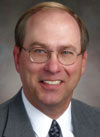 |
|
Pennow
|
Green Bay attorney Mark Pennow also strives to convey that message to
law students. "I do my best," he says, "to undermine the notion that we
have to be Rambo every day. What I hold out to these folks is that we
can achieve far more in the legal profession through consensus than we
can through confrontation. We save confrontation for when it's really
needed."
Another key component of the lawyering skills course, in Pennow's
view, is showing students that lawyers, of whatever age, are real people
with real lives. "I think a lot of third-year students," he says,
"experience this trepidation about running into the ogres that run law
firms. In this course, they see what we're like and, more importantly,
what we're not like. You walk into the room, tell a joke, and in
addition to laughing politely at your terrible joke, they smile with
relief that you're not some stuffed shirt who's going to give them a
rough time."
On top of that, Pennow says he's gained personal rewards over the
years as he's participated in teaching different portions of the course.
Teaching law students is "a rejuvenating process," he says. "It gives me
a fresh outlook on what I take for granted from day to day. It's almost
like a vacation for me; it's that rewarding. It just makes you feel good
about being a lawyer. That sounds corny and trite. But it does make you
feel you're doing something to make the legal profession a better place
to make a living."
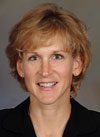 |
|
Stark
|
Going Back to Give Back
Getting a realistic picture of lawyers' lives, professional and
personal, is part of what students seek from the skills course,
according to Eau Claire County circuit court judge Lisa Stark. Back when
she was practicing civil law, she taught the unit on preparing for civil
trial during four different semesters. While doing so, she fielded lots
of inquiries beyond course content.
"They want to know what you like," Stark says, "and what you don't
like. What about free time? How does family fit into the scheme of
things? What's it like in the northwest part of the state? Why should
they go there versus Chicago? They have lots of questions."
For Stark, the rewards came from sharing ideas with students and
fellow faculty, often learning something she was able to use later back
in her own practice. "And at the end of the week," she notes, "students
say `Thanks, we enjoyed working with you. We learned a lot.' That's
pretty satisfying."
Years before teaching the course, Stark took it as a law student. Now
that she's on the bench, she assumes yet another role in the class -
serving as judge during the civil trial week, when students get to put
the skills they've learned into action in a simulated civil trial.
Whether serving as an instructor or a judge, "I feel it's an honor
and privilege to be asked to do it," Stark says. "I consider it a way of
giving back to the law school, as others have done before."
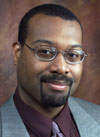 |
|
Whitworth
|
Milwaukee attorney Shannon Whitworth graduated from law school in
1996; he also is a former skills course student. Not long after
finishing law school and entering practice, he volunteered to help in
the course segment called the skills intensive training weekend. In
those two days, students use the various skills they've learned to
represent clients on both sides of a legal transaction. Some 30
volunteer attorneys come in that weekend to critique the students'
performance.
Since his first teaching experience, Whitworth has been back many
times to teach in other components of the course. "Every time," he says,
"I've got another year under my belt, and the students are another year
younger."
Whitworth is still close enough to his law school days to relate to
what his 3L students soon will encounter. "Coming out of law school is a
scary time," he notes. "Hopefully these students will wind up missing
some of the land mines" that typically lie in new lawyers' paths.
For Whitworth, the gratification comes from having "the opportunity
to assist in bringing people along," he says, "and making them better
attorneys. That also makes me a better attorney and makes the profession
better as a whole."
Indeed, he sees his participation as a professional obligation - but
one that reaps rewards all around. "From a selfish perspective," he
notes, "I benefit, we all benefit, by having better lawyers."
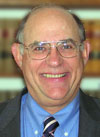 |
|
Roethe
|
Shedding Light
Months ago, attorney Jeffrey Roethe blocked out a week in February
2005 when he'll make the daily 50-mile round-trip from Edgerton to the
U.W. Law School. By his count, next semester marks the 27th time he's
participated in the course. Having taught various units over the years,
he now teaches estate planning and business organization.
In the business unit, he and his students work through a business
start-up, from negotiating the initial acquisition, to solving
employment problems, to selling the enterprise. "I'm on the spot,"
Roethe says of his role in the course. "The students put me on the spot
all the time. I say to them, `This is our law firm for the week. So ask
me anything you want.'"
Learning to participate in group dynamics is one of the elements of
the skills course that Roethe feels is most valuable. "We sit around in
our small group," he explains, "and we act like a law firm. We ask, `How
are we going to approach these problems?' It's a great learning tool for
law students."
For his part, watching a student "get it" is one of the biggest
satisfactions. "It's fun," Roethe says, "when somebody is talking about
tax codes, for instance, and I diagram what happens on the board, and
then all of a sudden someone says, `I never understood that before.' The
light goes on. That's what our role is" as teaching practitioners.
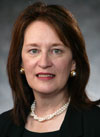 |
|
Furay
|
Madison attorney Cate Furay remembers witnessing similar moments over
the years as she's taught different segments of the course. One such
incident occurred at the end of a skills intensive training weekend. "I
was walking down the hall," Furay recalls, "and I heard a student who
was coming out of a negotiation session say to her partner, `I'm a
lawyer!' Not I'm going to be a lawyer, but I
am a lawyer. We had done what we're supposed to do to help the
students make that mental shift."
Guiding students through that transformation as they approach the
finish line in their law school careers is part of what keeps Furay
coming back year after year to teach. "A lot of it is that you get
hooked," she says. "Every week I teach, it reinforces for me what a
wonderful, generous profession this is."
The U.W. model could work at other law schools, Furay maintains,
adding that a strong factor in the U.W. program's success "is we're
blessed to have Ralph (Cagle). He's well-known and well-respected by the
bar."
Being involved in various national organizations, Furay meets lawyers
all over the country who give their time to aid the profession. That
experience leads her to suggest to other law schools that they "find
someone like Ralph" and be open to the possibilities. "I think most law
school deans would be surprised," she contends, "how many lawyers would
be willing to give this a shot."
Wisconsin Lawyer
